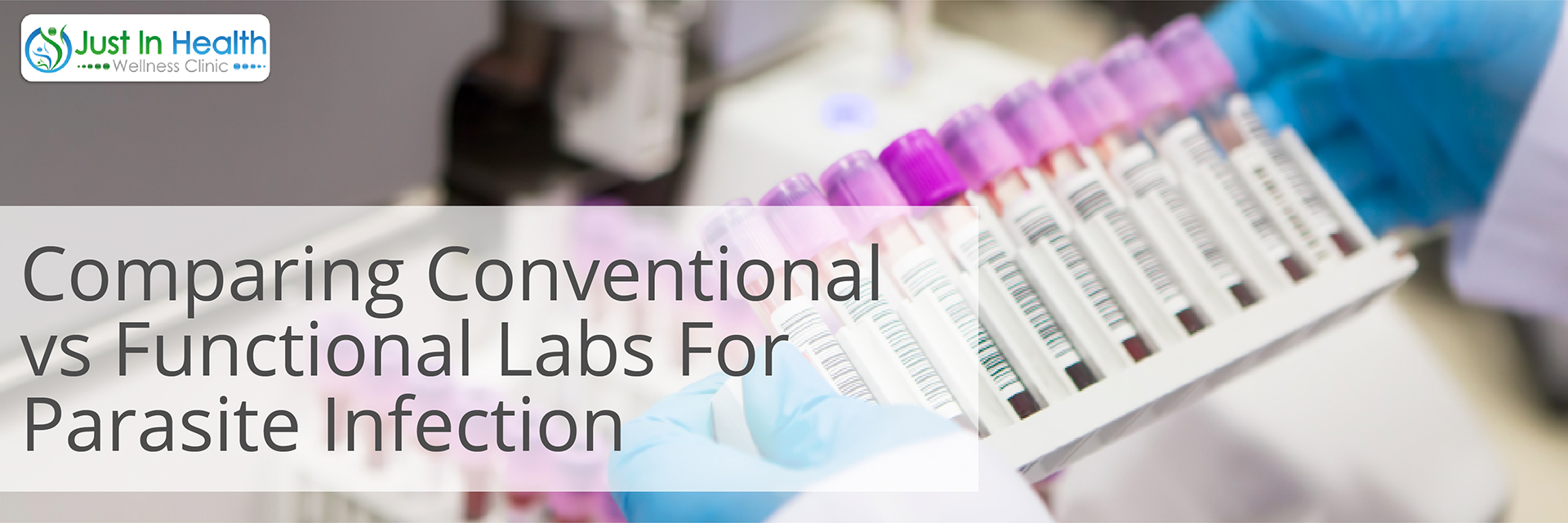
 By Dr. Justin Marchegiani
By Dr. Justin Marchegiani
Today, we will be comparing conventional lab work, looking for infections versus our specialty test that can help pick up and detect infections. So I had a patient come in to me last month and she presented with some symptoms: gas pain, constipation, diarrhea, acid reflux, headaches, some mood issues, and even some tingling, stinging sensation in her leg area. Of course, one of the first places I always look at is I look at the gut because so many infections can create a major sequelae of symptoms such as mood and all the things I listed off. So we always want to look at the gut.

We have here my patient’s conventional lab work and I'm going to put it right on screen. You'll see in the background. And what you're going to see here is we got some blood work and on that blood work, it’s showing inflammation. So off the bat, you can see that the white blood cells are going to be on the lower side. I'm going to use my monitor here and my mouse to circle that. You can see white blood cells are on the lower side. So we’re thinking maybe a chronic infection. We go down here below. We see our monocytes, our eosinophils and basophils on the higher side, which makes me think a more of an acute infection.
Now when I see eosinophils, I always think parasites potentially. It can be allergies, but mainly parasites. I see monocytes, I think gut inflammation and basophils that can be just there from inflammation as well. Now when we go up a bit, we're going to see neutrophils being low. When I see low neutrophils, I'm thinking chronic bacterial infection.
So you can see everything for me goes back to the gut. So I'm thinking maybe an H. pylori infection, maybe a parasitic infection, of course, all of this inflammation and damage is going to create leaky gut as well.
With this patient, we did a couple of things off the bat. We did an autoimmune diet and we saw significant improvement in some of the symptoms: some of the mood, not quite with the energy, some of the mood and the anxiety, and just overall improvements in digestion. She significantly got better going on an autoimmune and low FODMAP eating plan.
So that's kind of the foundation. We don’t just use the labs and used supplement programs and fancy things like that to promote healing. We start with simple diet and lifestyle modalities to help get inflammation down, and then from there we can use specific lab tests.
Need help with interpreting your lab test results? Contact a functional medicine doctor HERE!

So off the bat, here is the conventional blood work as you can see; but one of the biggest things that irk me is this patient told me their conventional doctor said nothing was wrong. Well, as you can see, a functional medicine doctor is going to look at this and be pulling their hair out, like of course something's wrong. We see the white blood cells low. Also, we see the eosinophils, basophils, and monocytes elevated. We’re thinking an infection and then we see the low neutrophils, which makes me think chronic bacterial infection. So we start off that and kind of putting my hypotheses out, kind of week 1 and then 3 or 4 weeks later, after we get some stool testing back, here’s our specialty stool test. You can see off the bat, we had an H. pylori infection came back positive. You can see down the road here, we had elevations in fecal fat. That means we're not digesting our fat optimally.
Now if we know Physiology 101 on digestion, we need a nice low pH to activate our proteolytic enzymes, pepsin, that helps kick off protein digestion. That nice low pH triggers our gallbladder and pancreas to produce lipase and enzymes to break down fat and emulsify fat via the gallbladder. So if we don't have the right digestion in the stomach, that's going to screw up digestion downstream and instead of that first and second domino knocking over. If the first two don't fall, the third and fourth won’t fall either; hence, we see elevations in fecal fat. It's automatically low hydrochloric acid levels and low digestive enzyme levels naturally.
Down the list, look what came back here. We see two parasitic infections: Blasto and Giardia. And I’ve done videos on these just recently, one of my co-host Evan Brand came back with Giardia and Crypto. We just had a podcast on that this week. So go see BeyondWellnessRadio.com for that podcast but he came back with Giardia and Crypto. This patient came back with Giardia and Blasto.

So I’ve actually coined this term, The Three Amigos, because I’ve seen it a handful of times this year. You got H. pylori on one side. H. pylori is known to decrease stomach acid via the enzyme urease, which takes urea from protein metabolism, breaks it down into CO2 and ammonia. CO2 triggers the breath test for the H. pylori. That’s what makes a breath test positive. It’s the elevation of CO2 and the ammonia has a pH of 11. So that raises the pH away from the acidic zone which then decreases the ability to activate those proteolytic enzymes. So H. Pylori, that messes up digestion.
This literally blasts open—it eats our food and blasts open creating pain and inflammation in its various four stages. That's another one and this patient had symptoms of digestive pain which makes sense with the Blasto. And then Giardia can also affect the fat digestion, too. It’s known to live or inhabit the bile ducts as well and can create inflammation and make it harder to break down fat. And this patient had all of these symptoms: the acid reflux, the pain, the constipation, diarrhea; so it totally makes sense here.
One last thing we see is the IgA and IgA2 is very high. Now IgA is an immune marker. It's what lines the mucosal membranes in our mouths, our sinuses, digestive tract, urinary tract, vaginal canal, you name it, and it's our first line defense.
And I always tell my patients, it’s like the Star Trek. The Star Trek ship, it's got the force fields up so when the Klingons attack, the laser beams literally bounce off the ship, and this is what happens with IgA. It’s that force field, so when invaders come in, it protects us.
Now IgA will go really high off the bat when invaders are coming in, and you can see IgA2 is really off the charts here, but what's interesting is look at IgA1. It’s in the very, very bottom part of the range, barely even registering at 0.44, so technically that’s in the bottom—I want to say bottom 1%, bottom 0.1% of the range. So you can see IgA 1 low immune stress, IgA 2 hyper immune stress, definitely an infection, definitely inflammation, and our mucosal membrane barrier is weakened on one side but heightened on the other side because we have two different subtypes here.
Get professional advice and a FREE consultation with a functional medicine doctor by clicking HERE!
What’s the take home message? Well, number one, if you go to the conventional doctor and you're told you're okay, you have got to go see a functional medicine doctor. If this patient didn’t come and see me, I’m confident in the next few months working together, we’re going to be able to get this person significantly better. But if they did not come to see me off the bat, they would think it's all in their head. They would probably be put on an acid blocking medication, may be an antidepressant, and told to go home which is really sad because there are three major infections here and we know it. And this isn't just something that’s in her head. This is something that's real and there is physiological roots at the underlying level. And not to mention that, we know the food, just making the food changes with the FODMAPs and the AIP, the autoimmune plan, made a massive difference.
So this patient is one out of millions that you know will be helped, but there are millions more that are being told it's all in your head and just being sent home. And I want people just to go back here, look at the conventional tests. Now this, you can just see all of the markers that are off here, she was told she's fine. Now I have patients that come in with tests that don't even look like this, barely anything’s even flagged. No L’s or no H’s, but things may be slightly out of range and we’ll still do tests and we'll see tests that still come back with infections like this.
So if you're feeling sick and you know something’s not right and your doctors told you your lab tests are normal even though something’s wrong, you got to dig in. This person did and I’m very happy she digs, we’re going to be able to significantly help her health get to a higher level and you can, too. So click on screen, make sure you subscribe, get access to more videos and great information like this and help, kind of really helped all my patients get their health back in their hands.
Click HERE to get in touch with a functional medicine expert to interpret your lab test results!